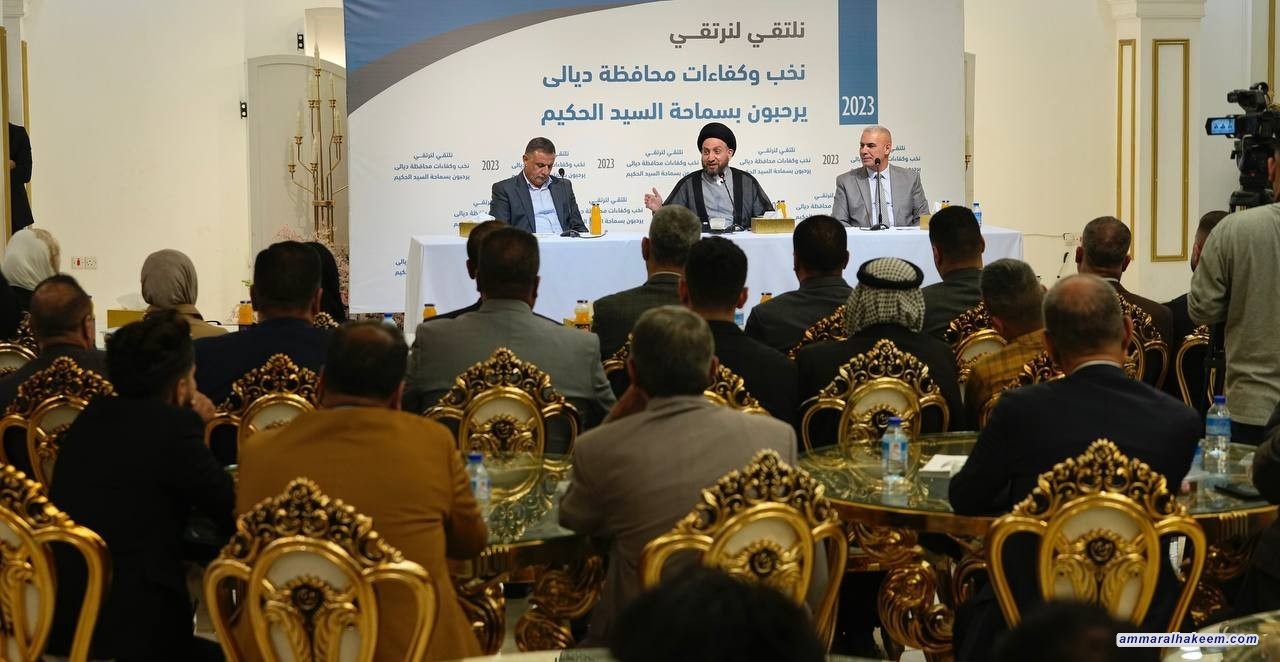Sayyid Al-Hakeem calls to abandon rentier state, revitalize agriculture, industry, tourism, investment, technology sectors
From the stations of His Eminence’s visit to Diyala governorate was the extended meeting with the elites and competencies of Diyala on 1/3/2023, where Sayyid Ammar Al-Hakeem, head of Al-Hikma National Movement, paid tribute at the outset and after listening to the invaluable interventions of the audience in Diyala governorate and the level of urban and service development and the return of life to its normal, calling on the elites and competencies to assume their responsibilities in terms of spreading optimism and positive spirit, and abandoning the negative stereotypes. H.E. indicated that corruption needs remedies, but at the same time, it needs realism. Not everything that is heard about corruption is true or proven.
H.E. renewed his call for the adoption of a program of action to leave the rentier state and that agriculture, industry, tourism, investment, and technology are all files capable of providing substantial financial revenues while at the same time discouraging oil price volatility, indicating that agriculture needs management of water and utilization of modern automation and irrigation methods and activation of political and diplomatic communication lines with upstream countries, while industry needs a new philosophy to restore factories to status and enable the private sector to take its role in the rotation of the domestic product wheel. H.E. stressed that tourism needs a tourist environment, accepting the culture it carries, legalizing and categorizing it, H.E. also pointed out that investment needed to be prioritized and to leave the investor's pre-judgment that he is seeking profit and that it is a legitimate right.
In the field of technology, H.E. called to sail in this world and use Iraqi competencies in that area, stating that the Government's curriculum was based on priorities and that the current Prime Minister was closely following his commitment to the House of Parliaments.
H.E. renewed his interpretation of Shia patriotism and said that "Shi'a as a sect come together on a unified ideological vision wherever they are, but at the same time they are connected to a social contract with their partners at home, thus bringing them on national issues within the geographical boundaries of their countries closer to their partners than other Shi'a in other countries. Shi'a patriotism was the Sunni and Christian patriotism by virtue of its social contract charting their interests with the partners of the homeland. Shi'a, like any sect in which they were religious, secular, liberal, etc., were bound by creed and bound by their social contract with their partners and possessed high intellectual diversity.
Regarding the election law, H.E. indicated that the problem is not in the name of the law or the mathematical equation for counting votes. What we need is a law that achieves political stability, maintains balance first, and expresses the philosophy of the parliamentary political system through encouraging integration and producing political blocs with a unified philosophy between what is the House of Representatives or provincial councils and all stages away from desires and personal interests, calling to observe the atmosphere change in Iraq, finding the right remedies and transforming the atmosphere into a societal culture, stressing the need to preserve Diyala's social fabric and social harmony and to bring perpetrators to justice without exception or favor.
H.E. also called for the inclusion of the private sector in the management of educational and health affairs and the regulation of the relationship between citizens and institutions through the use of companies that specializes in management, stating that thinking outside the box on these matters does not cost the state anything and may bring profit while at the same time providing a good service to the citizen.


/9/3/photo_2025-12-10_09-25-13.jpg)
/9/2/photo_2025-12-10_09-17-58.jpg)
/9/1/photo_2025-12-10_09-11-13.jpg)
/8/3/photo_2025-12-09_10-42-49.jpg)
/8/2/photo_2025-12-09_10-37-31.jpg)
/8/1/photo_2025-12-09_09-54-18.jpg)
/7/1/photo_2025-12-08_09-38-41.jpg)
/5/1/photo_2025-12-07_09-25-35.jpg)
/3/2/photo_2025-12-04_11-05-55.jpg)
/3/1/photo_2025-12-03_11-49-28.jpg)